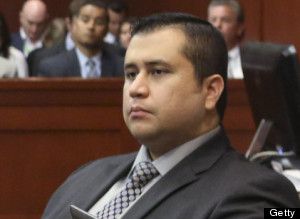Law and Crime
Five Things Trayvon Martin Didn't Change
The George Zimmerman acquittal has had nada legal impact
Posted August 7, 2013

His acquittal changed nothing
In the aftermath of the trial of George Zimmerman, protests erupted around the country, in Florida and elsewhere, demanding a range of legal remedies for the failure for Zimmerman to be convicted and punished for shooting unarmed teenager Trayvon Martin. Not much has happened. Here's why.
1. Federal prosecution of Zimmerman. Perhaps the loudest demand (from Jesse Jackson, Al Sharpton, and others) was that Zimmerman be tried again on federal civil rights or hate crime statutes, which Attorney General Eric Holder announced that the justice department was considering. This idea made no sense from the start, since to bring such charges federal authorities would have to prove additional elements beyond those the Florida prosecution failed to establish in the Zimmerman trial -- namely, that Zimmerman expressed and maintained bigoted attitudes towards blacks that motivated his shooting of Martin. But, there really is no such evidence. Perhaps Holder and the DOJ are really mulling this one over, but it seems increasingly unlikely that such a costly effort in terms of time, energy, money, and racial tensions will be mounted.
2. Repeal of "stand-your-ground" laws. When President Obama spoke out movingly about the Zimmerman-Martin trial, he called for one specific action: reconsideration of "stand-your-ground" laws that -- while not explicitly raised in the trial -- were thought to have influenced the jury to acquit Zimmerman. Florida passed the first such law in 2005, and at least 30 other states have followed suit. So, going into the trial, the trend was the opposite of what the President advocated. Since then, nothing has changed. For one thing, stand-your-ground laws are local and state statutes over which the President and the federal government have no control. And while protestors have sat in at Florida governor Rick Scott's office protesting stand-your-ground there, polls since the trial indicate that a majority of Americans favor these laws, and won't be changing them any time soon.
3. Toughen rules for permits to carry concealed weapons. Zimmerman had a permit to carry a gun and, although a petition was circulated to repeal his permit on the grounds that he was unfit for one, it is highly unlikely it will be revoked. After all, he wasn't convicted of misusing his weapon. Recently, Zimmerman was stopped in Texas with a gun in his glove compartment, which he was perfectly entitled to do, since Texas recognizes Florida gun permits. In larger terms, keep in mind that the United States Congress rejected tougher gun permitting standards for mentally ill people in the aftermath of the Newtown, CT massacre perpetrated by a possibly mentally ill individual. In the meantime, gun outlets have reported increased gun sales since Newtown, and more states have loosened their gun laws than have tightened them since then.
4. Legalize marijuana. As an alternative to unrealistic prayers that the United States will soon be making it tougher for people to carry and shoot weapons, a more plausible direction to pursue might be to liberalize drug laws. The logic? There were no African-Americans on the Zimmerman jury -- let alone no African-American men. An important reason is that so many black men are ineligble for juries because of their prior criminal convictions. The largest source of these convictions is drug law violations, since four times as many African-Americans are arrested for marijuana offenses as whites, even though the two groups use the drug at about equal rates. Of course, marijuana has been legalized in the states of Washington and Colorado. More states will follow in coming years -- but it is unlikely that these will include Florida and other red states. Attorney General Holder has called for sentencing reform so that fewer minorities will be imprisoned -- but it is not clear yet (a) whether and how this will include drug laws, (b) a Republican House will pass any such reforms.
5. Permit ex-cons to serve on juries. Of course, the underlying reason there are so few black men on juries is that the U.S. is so tough on ex-convicts. In many states, like Florida, they can't serve on juries, just as they can't vote in many of these states, which creates large racial disparities in the rate of African-American participation in the legal and political systems. Why shouldn't people who have served their time and are willing to act constructively by voting and by being available for jury duty be allowed to do so? Psychologically, this seems a good way for them to feel more connected to society. But, like legalization of marijuana, those states where former convicts are denied rights are not going to change these laws any time soon.
So, aside from giving the President and others some affecting speaking points, it seems little will change due to George Zimmerman's acquittal.
Follow Stanton on Twitter


